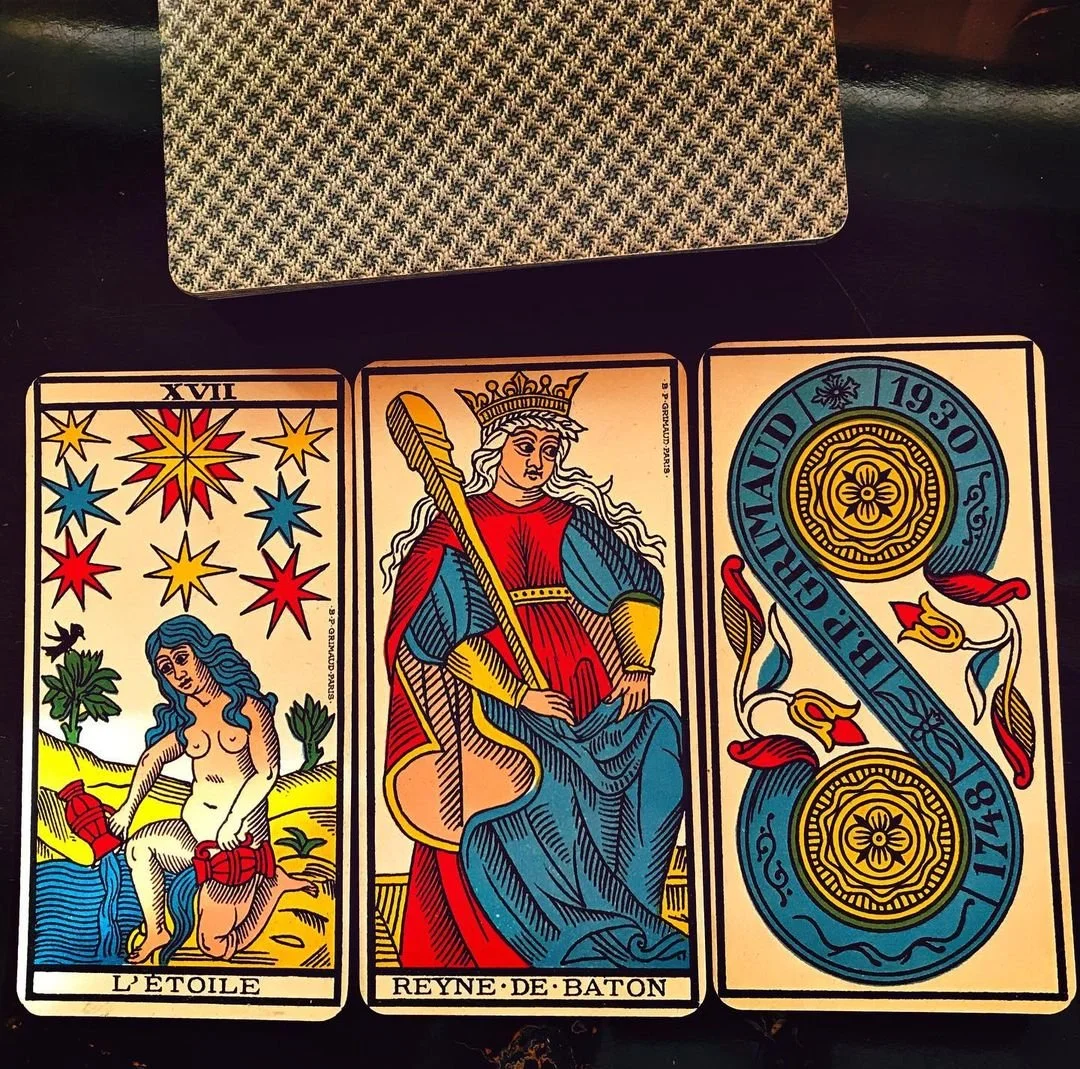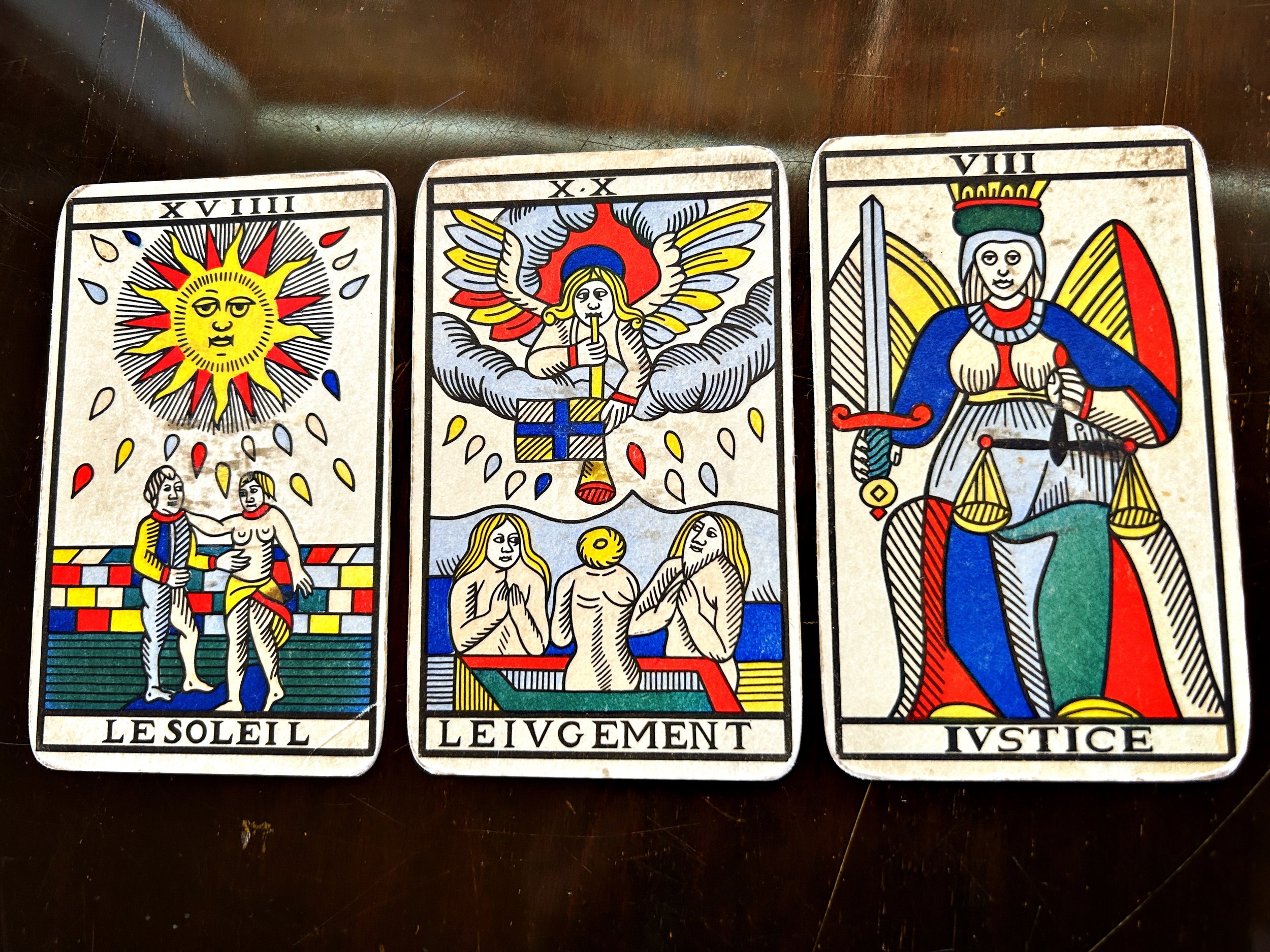A three-card challenge
The 3-card challenge is a daily affair. What is the Queen of Spades’ intention here? To split the Page and Queen of Coins, to defend them, or to take only the Queen of Coins’ head so she can then mess with the young one’s head as she pleases?
How about this example here when we look at The Lovers, the Empress, and the World? Is this string about choosing the perfect woman, or letting your mother choose for you? Some men are impressionable. And then they stay that way. Even in their 50s.
Or take this example of a real exchange, one in which I had to make a ruling based on little information. The Star, the Queen of Batons, and 2 Coins were on my table.
‘It’s too late to discard it now,’ I told the woman in front of me wanting to know how she could get rid of her obsession, the kind that made her hair turn white.
‘Sometimes you make unbreakable pacts with your own giving.’
‘Is this good or bad?’ the other wanted to know. I point to the absence of the Devil in the 3 pictures on my table. ‘It depends on the signature, I then said.
The woman's eyes got bigger than the 2 coins on the last card.
‘How did you sign off?’ I asked her.
‘I don't want to talk about it,’ she said.
‘Fine,’ I say, and make a ruling: ‘unbreakable.’
§
Let me just put it this way. Sometimes it’s actually an understatement to say that a 3-card draw is challenging. When it’s styled, forged, or hammered in what the other doesn’t want to talk about, you sit and stare. Suddenly both the majors and the minors conspire to show, rather than tell how things are. The pips can punctuate a situation, display the intensity of an emotion, or point to the degree of damage in it. The pips are our modifiers telling us something about the power and agency of the court cards, while the trump cards describe the topic or tell us something about the character or nature of things.
As usual, the answer is driven by the question and its context. When that is not available, often due to muddled formulations, I point to the text in the Heart Sutra, ‘not this, not that…’ Especially when the moon is dark.
Lastly here, let me point to another example, a more concrete one from the life and time of this fortuneteller. The Heart Sutra can wait, especially my own…
Once I showed up for my own work in a sloppy way. I sent out a newsletter containing a broken link to the opening of the registration for one of my new courses. I remedied the situation immediately by sending out another missive. People were signing up, to my great appreciation of their promptitude, and all was well.
But still, the whole affair made me think: ‘how did I show up for the launch event?’ I asked this question while clearly being under the influence of the mainstream talk about the necessity to ‘just show up.’ I got instantly suspicious.
You see, the favorite cliché going around, from marketing to personal life, is for people to ‘just show up’ – for work, family, and clients – with showing up being a sign of signalling virtue, namely the virtue inherent in making yourself available.
Suppose you got these cards below for your nagging suspicion that there’s something wrong with showing up the way this imperative is being thrown about without any discrimination.
Would you read the string, Sun, Judgment, and Justice, as a sign of rising to do what is truthful and right, or as a sign of having to discard showing up for the garden variety, focussing instead on the more intimate relation, one that’s actually free of imperatives?
When Justice holds her sword on the side of the public depicted on the Judgment card, we’re in for a sentence whose premise is sound judgment, not loud judgment.
If ‘showing up’ is not a manifestation of a symmetrical relation, then let us ditch the idea that we have to, just because this phrase is what everyone else is talking about. Let us not show up for concepts, opinions, and public flattery. Let us show up instead for the situation that mirrors perfectly our true aims and intentions.
In my case, I was sloppy and I made a mistake. I fixed it. And that was all. It was not about the quality of ‘showing up’ also in response to shaming myself à la the kind of shaming discourse that’s currently in vogue. As it happens, I like to shame myself all the time, when appropriate, as this act enables me precisely to do something about it. Any other kind of shaming that’s also an expression of signalling an implicit virtue is of no use to me.
The point I’m trying to make is that while we can question the two or more possibilities that the cards can show may be the case, it’s worth considering where our question comes from, or what informs it. We cannot see what there is to see, if the premise for our seeing is not already shaped by deconstructed beliefs. Reading cards from the vantage point of current mythologies leads to more fictions, not to observing what in actuality is the case.
*
The tour de force
My course book on the Marseille tarot takes care of many examples of the challenging kind, and then there’s Threads…






